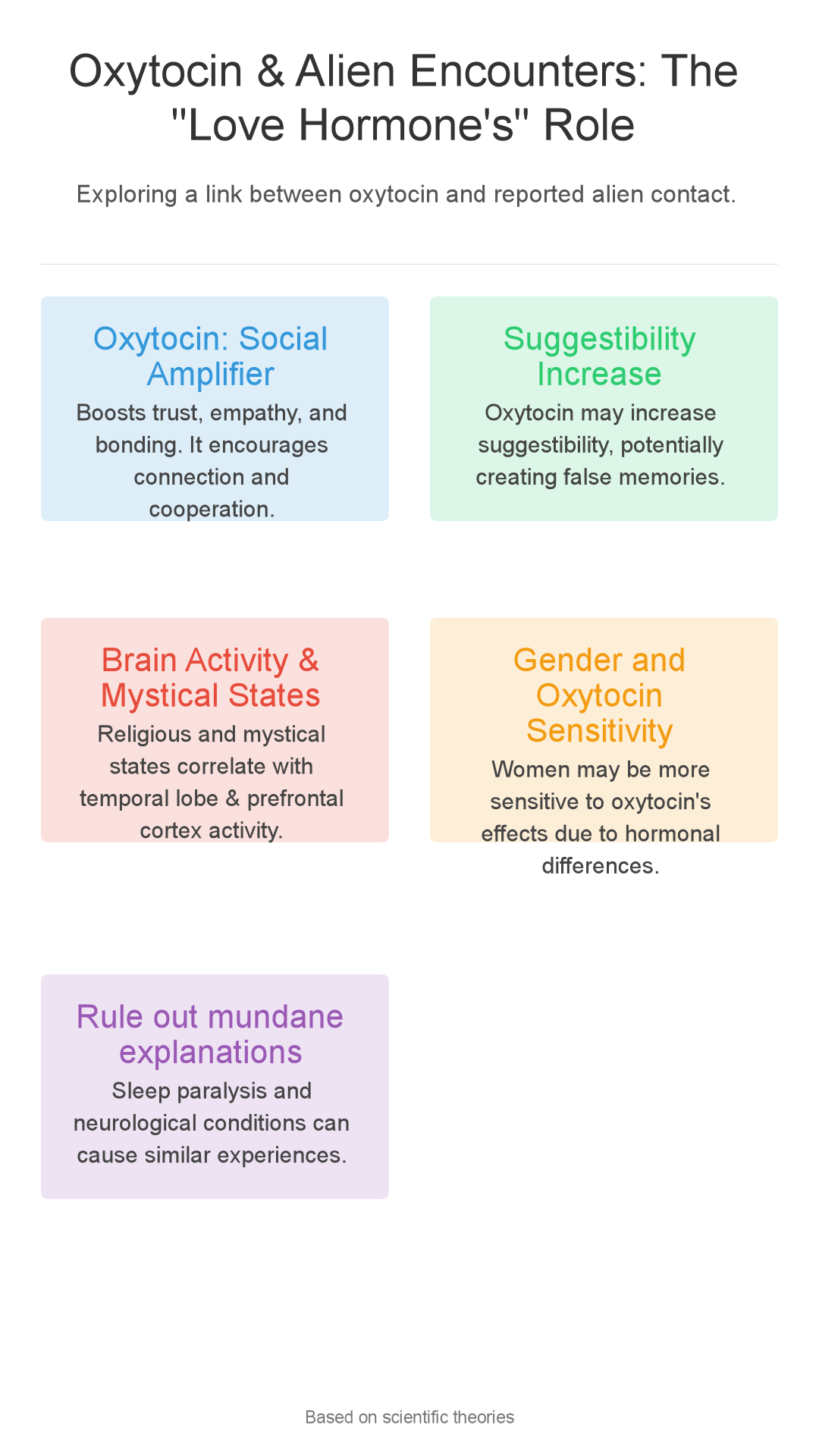
Could the “love hormone,” oxytocin, be linked to women's experiences of alleged alien contact? This
Ever felt a shiver down your spine reading an alien abduction story? What if the “love hormone,” oxytocin, plays a surprising role in these intensely personal experiences, particularly for women? Buckle up and hit that like button – we’re about to explore a truly cosmic connection!
Alright, fellow truth-seekers and sci-fi aficionados, prepare to get a little… strange! We’re diving deep into a fascinating theory that links the warm, fuzzy feelings of human connection to… well, extraterrestrials.
Specifically, we’re investigating whether oxytocin, the hormone celebrated for its role in love, bonding, and childbirth, might influence the subjective experiences of women reporting alien encounters. Sound out there? Maybe.
Oxytocin’s Role in Social Bonding, Trust, and Suggestibility
Oxytocin is more than just the “cuddle hormone.” It’s a powerful neurochemical with a significant impact on our social behavior. Let’s break down its key functions:
Oxytocin: The Trust Amplifier
Oxytocin is best known for promoting feelings of trust, empathy, and strong social bonds. Research shows that administering oxytocin can increase trust in economic games and improve our ability to recognize emotions in others.
Think of it as nature’s social lubricant, encouraging us to connect and cooperate.
The Suggestibility Factor
This is where things get really intriguing. Research has also demonstrated that oxytocin can increase suggestibility and potentially contribute to the formation of false memories.
For example, a study published in Psychological Science found that individuals given oxytocin were more likely to incorporate false details into their memories of an event.
Vulnerability and Emotional Experiences
Now, consider the context of alien contact narratives. These experiences are often deeply personal, emotionally charged, and sometimes described as traumatic.
Individuals recounting such events may be particularly vulnerable to suggestion or the unintentional incorporation of external information into their memories.
The Neurobiology of Alien Contact Experiences: A Subjective Reality
Let’s be crystal clear: we’re not dismissing the possibility of genuine alien encounters. However, it’s essential to acknowledge the subjective nature of these experiences and explore their potential neurological underpinnings.
Internal Landscapes and Altered States
Many researchers view alien contact experiences as complex, internally generated phenomena that can involve altered states of consciousness.
These states might be characterized by vivid imagery, feelings of dissociation, and a profound sense of significance.
Brain Imaging and Mystical States
While directly studying alien contact experiences with brain imaging is difficult, researchers have examined similar phenomena, such as religious experiences and mystical states.
These studies have revealed correlations between these experiences and activity in specific brain regions, including the temporal lobes and the prefrontal cortex.
The Default Mode Network (DMN) and Self-Referential Thought
The default mode network (DMN) is a network of brain regions that’s most active when we’re not focused on external tasks. It’s involved in self-referential thought, such as daydreaming, imagining the future, and reflecting on the past.
Gender Differences in Oxytocin Response and Memory Processing
Here’s another fascinating layer to consider: gender might influence how oxytocin affects these experiences.
Women: A Heightened Sensitivity?
Research indicates that women may be more sensitive to the effects of oxytocin than men. This could be due to hormonal differences or variations in the distribution of oxytocin receptors in the brain.
Emotional Memories: A Gendered Lens
Men and women also seem to process emotional memories differently. Studies suggest that women tend to recall emotional events with greater vividness and emotional intensity than men.
This difference could potentially impact how alien contact experiences are recounted, with women perhaps providing more detailed and emotionally rich narratives.
Societal Expectations and Storytelling
Finally, we can’t ignore the potential influence of societal expectations and gender roles on how alien contact stories are constructed. Cultural narratives and stereotypes about femininity and vulnerability might shape how women frame their experiences, influencing the details they choose to emphasize and the overall tone of their accounts.
Alternative Explanations and the Importance of Skepticism
Before we jump to any conclusions, let’s step back and consider alternative explanations for these experiences.
Ruling Out the Mundane (But Still Important)
It’s crucial to rule out other psychological or neurological conditions that could mimic alien abduction experiences.
Sleep paralysis, temporal lobe epilepsy, and certain types of hallucinations can all produce vivid and unsettling sensations that might be misinterpreted as extraterrestrial encounters.
The Limits of Subjective Experience
One of the greatest challenges in studying alien contact experiences is the difficulty of validating subjective reports. Science relies on objective, measurable data, and personal accounts, however compelling, can be difficult to verify.
Critical Thinking is Key
Ultimately, exploring extraordinary claims requires a healthy dose of skepticism, critical thinking, and a commitment to rigorous investigation.
We must be wary of confirmation bias – the tendency to seek out information that confirms our existing beliefs while ignoring contradictory evidence.
So, what are your thoughts? Could oxytocin be a contributing factor in reported alien encounters, or are there other, more likely explanations? Share your theories in the comments below!
If you found this exploration of weird science fascinating, be sure to subscribe for more mind-bending content! We’ll continue to delve into the strange and wonderful corners of the universe, one bizarre theory at a time.

Enjoyed this? Check out our YouTube channel for video versions!
Enjoyed this? Check out our YouTube channel for video versions!



